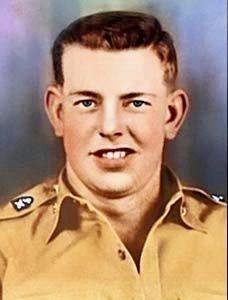Riff Raff: The return of Jerry Mack
by October 26, 2019 11:50 am 764 views

There were several hundred folks at Jerry Mack Garrison’s funeral. Few there knew him. But he was a Lamar kid and most of us grew up there and we know what it’s like to be overlooked, underestimated and bonded by being forgotten until you’re not.
U.S. Army Corporal Jerry Mack Garrison died, we believe, almost 70 years ago in an icy brutal bloody hell that was the Chosin Reservoir in Korea. Army intelligence, we’re told, failed to pick up on clues that the People’s Republic of China had several hundred thousands of troops ready to storm into the fight and stop the advance of United Nations’ forces – mostly American – into North Korea.
The Korean War began June 25, 1950, and ended with an armistice on July 27, 1953. It is considered one of the most destructive modern wars based on the military and civilian death toll, the near destruction of most of Korea’s major cities, and the brutality against prisoners of war on both sides. Almost 34,000 U.S. service members died in the conflict, with the daily death rate much higher than that of the Vietnam War.
Garrison, then 21, was likely overrun in early December 1950 by Chinese and North Korean forces as his army unit was in retreat. We can only hope he was killed and not captured.
Garrison’s remains were among those returned from North Korea by President Donald Trump in July 2018. The remains arrived at Joint Base Pearl Harbor-Hickam, Hawaii, on Aug. 1, 2018, and were processed through the Defense POW/MIA Accounting Agency laboratory for identification. His identity was confirmed on Aug. 7, 2019.
Alice Pearson, his sister, last saw him when he was 19 and joined the Army. She was seven years his junior.
“It was when he joined and left,” Alice said when asked of her last time to see her older brother. “You know,” she said after a pause, “he never came back.”

She was not surprised to see her brother off on the adventure. In the summers he would travel to North and South Dakota to work the wheat harvest.
“Back then, we had a lot of trains come through Lamar, and when the trains would roll through town, he and a friend would hop a train and go to the Dakotas and go work in the fields,” Alice said. “They would work the wheat harvest up there, and then use a train to get back home.”
Alice said her brother didn’t have much time for a lot of girlfriends, but he was sweet on Mary Frances, who lived just a few miles down Highway 64. Jerry Mack would ride his horse to court Mary Frances. Alice said she’d stay up at night until she could hear him coming home. Her brother, Alice said, was fond of Eddy Arnold’s “Cattle Call” song.
“He could sing it so loud and he had a good voice. .. I would always stay awake until I could hear him riding toward the house,” Alice said.
Alice said he was saving up money from his odd jobs and was going to get a car when he came back home.
But he didn’t.
Alice was 13-years-old when news came that Jerry Mack was missing and presumed dead. The oldest son, the beloved older brother, the Cattle Call crooner would never make it back to see his family, friends in his small town, or Mary Frances. Not unlike many Gold Star families, the reality weighed on parents Elmer Jeff and Maudie Leo Harmon Garrison for the rest of their lives.
“They were sad, especially my dad. I mean, it just broke his heart. And my momma, you know,” her voice trailing off. “It just destroyed our family for lots of years.”
There were several hundred folks at Jerry Mack Garrison’s funeral held Oct. 22 in the Lamar Cemetery. At least 150 of those were students from nearby Lamar Public Schools. Even with the large crowd and a U.S. Army honor guard providing full military burial honors, there was nothing we could do to go back in time and assuage the heart of Elmer Jeff, or bring that tune again to Alice’s ears or give a young man the joy of buying his first car.
The only thing we can do for Jerry Mack and his family is to remember. We should ensure that our government brings our service members back home – no matter if it’s 70 years or 170 years. We should know that gathering respectfully for Jerry Mack is a message to all generations that service and sacrifice is not forgotten.
And as Alice would wait for Jerry Mack to return from a visit with Mary Frances, we should all await with hope for the men and women who have yet to return home for a peaceful rest; we should all remember they were young, with dreams, and a song in their heart.
“He rides in the sun,
‘Til his days work is done.
And rounds up the cattle each fall.
Singin’ his cattle call.”
